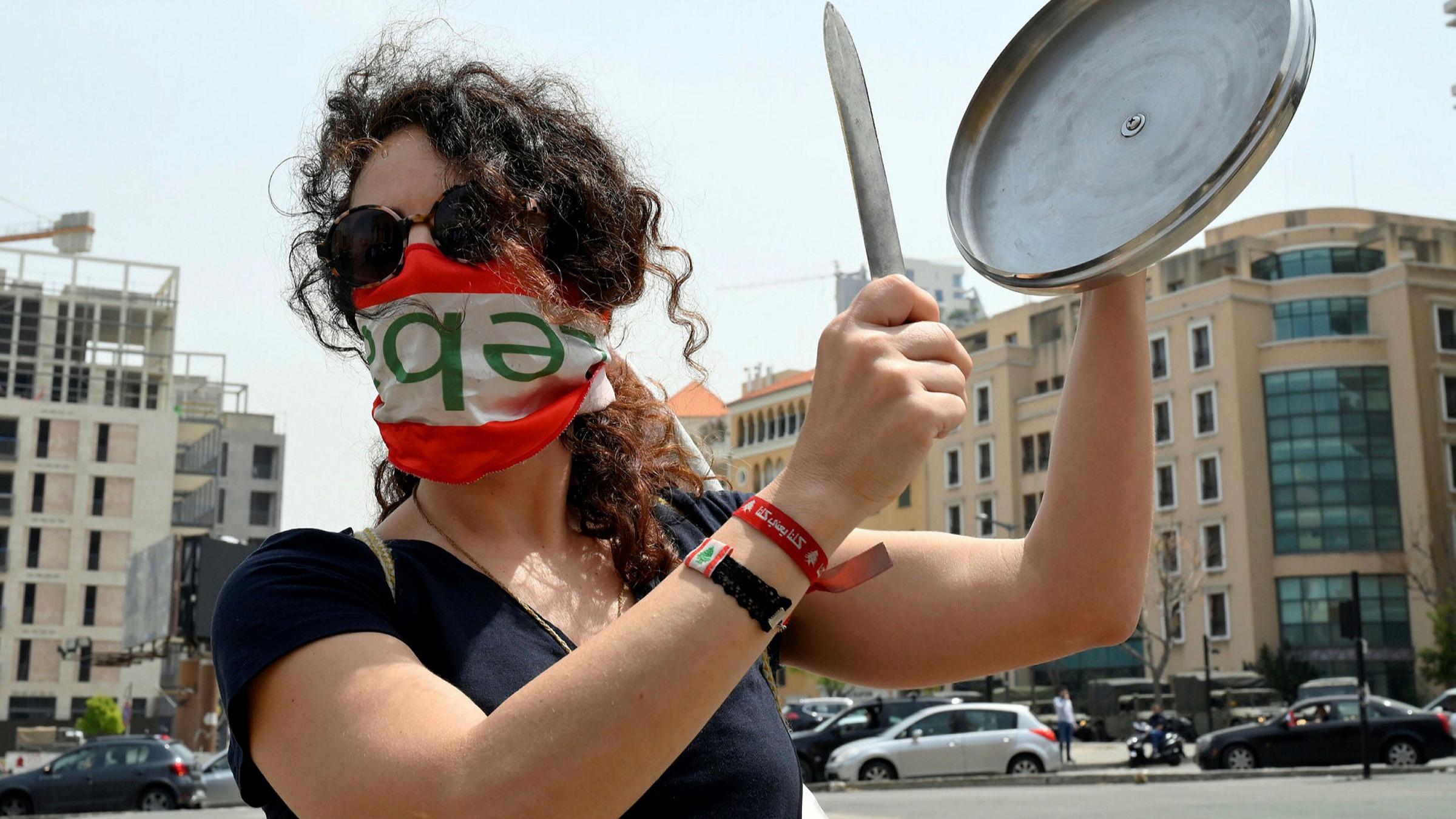Syria, Lebanon, and Iraq are all teetering on the brink of economic collapse. Europe cannot afford to be a helpless bystander.
It is hard to imagine that the suffering and despair across the Middle East could worsen. But across Syria, Lebanon, and Iraq a new economic unravelling is continuing apace, threatening to throw the region into even deeper turmoil. In Lebanon and Syria state finances are collapsing and hyper-inflation is setting in, while in Iraq a dramatic collapse in oil revenues has depleted the budget. All these countries are suffering the debilitating economic effects of covid-19 and the ramifications of the United States’ maximum pressure campaign against Iran. This interlinked economic unravelling is not just worsening the humanitarian situation, with millions slipping into deep poverty, but is also likely to feed intensified social unrest, instability, and possible state collapse and conflict.
Europeans should urgently focus their attention on this economic implosion, which is likely to increase regional instability and associated migration and terrorism flows. Europe is already the largest external donor to the region, as exemplified by last month’s Brussels IV conference for Syria and the region, at which the European Union and member states committed €4.9 billion in new support. But such is the severity of the situation – and its potential impact on European interests – that greater resources and focus are urgently needed.
While some hope that this economic pressure will help bring about long-overdue governance reform across all three countries, the stark reality is that local elites, who bear prime responsibility for the deteriorating situation, remain focused on preserving their own interests rather than meeting the needs of their people. Europeans will need to navigate this core dilemma while also working around a US policy that seeks to use intensifying economic pressure to dislodge Iranian influence.
Syria is now ground zero for this regional implosion. After decades of corrupt mismanagement by the Assad regime, nine years of conflict has brought the country to its knees. This vulnerability is being exacerbated by covid-19, the deteriorating situation in neighbouring Lebanon, and tightening US sanctions.
Since last year the Syrian pound has lost more than 80 per cent of its value, sending the price of core goods soaring. The World Food Programme estimates that food prices have increased by 209 per cent over the last year and 35 per cent over the past month alone. The United Nations has warned of possible famine, with 9.3 million Syrians now food-insecure – an increase of 1.4 million over the past six months. More than 90 per cent of Syria’s population now live below the poverty line, with access to basic services extremely limited. Unemployment stands as high as 50 per cent and there are few social safety nets. The implementation of intensified US sanctions under the Caesar Act will seriously impede even legitimate economic development. Humanitarian inflows could also be restricted, even where sanctions exemptions exist, given the chilling nature of US measures.
While the US government, in particular, hopes that economic pressure will force Assad and Russia into significant political compromises to unlock international financing, this seems an unlikely bet. Assad remains wholly focused on maintaining his grip on power, and the more likely scenario is that the regime’s predatory instincts become even more pronounced, enabling its ongoing survival as the country crumbles around it.
For its part, Lebanon is also close to the edge. Provoked by longstanding economic mismanagement, but with pressures intensified by covid-19 and the secondary impact of economic pressures in Syria, Lebanon’s economy has gone into complete freefall. The currency has lost 80 per cent of its value this year, provoking massive inflation, including a rise in food prices by as much as 200 per cent. The International Monetary Fund (IMF), with which the government is negotiating a bailout package, estimates that the economy will shrink by 12 per cent this year. The Lebanese are unable to access their savings, more than 35 per cent of the population are estimated to be unemployed, and 45 per cent could soon be living below the poverty line. Even if Lebanon secures IMF support – though the political elite are dragging their feet over necessary reform, wary of measures that will impact their own interests – this will come with severe austerity measures, which are likely to fuel further unrest given the lack of an adequate social safety net. Meanwhile, the threat of new direct US sanctions targeting Hezbollah hangs over the country.
Economic implosion will further hollow out immensely weak states, laying the ground for social unrest and possible intensified conflict.
Then to the east is Iraq, whose economy has been hit by the double-whammy of covid-19 and the collapse in the price of oil, which accounts for 90 per cent of state revenues. The government now oversees a significant budget deficit to cover its own $4.5 billon monthly running costs and pay the millions of Iraqis on the state payroll. Youth unemployment stands at over 30 per cent, and the UN estimates that Iraq’s economy will shrink by nearly 10 per cent in 2020, with levels of poverty doubling to 40 per cent. The finance minister has warned of an “existential economic situation” and it remains uncertain whether the state will be able to cover salary payments over the coming months. To this backdrop Baghdad is under intense US pressure to reduce its dependence on Tehran. Iraq remains dependent on short-term sanctions waivers to import much-needed electricity from Iran. While the most recent US exemption was granted for 120 days, as opposed to the previous 30-day timeframe, Washington can be expected to turn the screw as Baghdad struggles to cut itself off from Iranian support.
The new government is now trying to push through reform measures, including cutting state salaries and accessing internal and external financing, but it is caught between immense internal and international pressures. As in Lebanon and Syria there are significant interests working against the implementation of necessary structural reform in Iraq.
Put together, the wider region is engulfed in a devastating economic collapse that is pushing millions of people into humanitarian crisis and risks provoking wider forces of instability. Economic implosion will further hollow out immensely weak states, laying the ground for social unrest and possible intensified conflict. Were covid-19 numbers to significantly increase in these conditions, the result would be disastrous given overstretched state resources and the lack of medical capacity. Those who can do so will flee, prompting both new migration flows and a critical brain-drain of the middle classes needed to construct a better – and stable – future across the region. Moreover, if recent decades are anything to go by, destabilising forces linked to Iran and extremist groups will capably fill the vacuum despite US ambitions to the contrary.
To this backdrop all European states should be immensely concerned, particularly given the profound impact posed by migration flows and terrorism threats from Syria over the past decade. While the recent Brussels conference was a marker of ongoing European support, it remains insufficient given the potential meltdown about to engulf the region. Europeans will need to work with other international parties, both to ensure that current pledges are actually delivered and that further support can be mobilised. The UN estimates that at least $10 billion will be needed to meet core needs during 2020. This figure is significantly higher than the $5.5 billon pledged in Brussels.
Europe’s options are clearly limited both by the intransigence of corrupt, ruling elites in these countries and the US prioritisation of weakening Iran through economic pressure. Europeans are right to want to press regional governments to initiate long-overdue governance and economic reform, particularly in Lebanon and Iraq where it may now be more feasible. But while it is right to hold their feet to the fire by conditioning top-down structural support on reform, there is a real risk that this will not deliver what is needed. Europeans also need to advance options to work around problematic local elites if worst-case scenarios are to be averted. This will require both international mobilisation behind increased assistance but also careful localised support processes, with a focus on strengthening societal resilience. This is especially true in Syria where the situation is most acute, but where the government remains wholly unwilling to focus on the needs of the population. Meanwhile, Europeans should prepare to channel increased bilateral aid into Syria if Russia shuts down UN cross-border mechanisms.
A refocused European approach will also require an enhanced effort to navigate the extraterritoriality of US sanctions, making the case to Washington that economic implosion will be counter-productive given that it will feed greater instability and create new space for Iran and extremist groups to exploit. As well as pressing for effective US sanctions waivers, including ongoing Iraqi exemptions to import Iranian electricity, the EU should create an independent financial channel – modelled on INSTEX (the Instrument in Support of Trade Exchanges) – that can facilitate regional humanitarian inflows in line with European objectives. Added to this, EU states should resist increasingly vocal US pressure to fully blacklist Hezbollah. This will only deepen polarisation and close off avenues for Europeans to push key Lebanese parties towards a necessary solution.
Ultimately, Europeans may not have it in their gift to reverse the downward economic trajectory now unfolding across the region. But they cannot afford to turn a blind eye, and must urgently intensify efforts to soften the economic blow before the situation becomes unsalvageable. The aim should not be to prop up a broken system but to recognise that implosion will only make a positive outcome even harder to achieve.
(*) Julien Barnes-Dacey is the director of the Middle East & North Africa programme at the European Council on Foreign Relations. His primary topic of focus is European policy towards Syria, the wider Mashreq, and the Gulf.
Barnes-Dacey’s recent publications include “To end a war: Europe’s role in bringing peace to Syria,” “The war next door: Syria and the erosion of stability in Jordan, Lebanon, and Turkey,” and “Responding to an Assertive Gulf.” He has worked as a researcher and journalist across the Middle East. Based in Syria from 2007 to 2011, he reported for the Wall Street Journal and the Christian Science Monitor. Previously, he was editor of Niqash, an Iraqi news service and worked for the Cairo Times in Egypt. He also headed the MENA practice at Control Risks, a private sector political consultancy.
Barnes-Dacey holds a BA in History from the London School of Economics, an MA in Middle Eastern Studies from the School of Oriental and African Studies, and studied Arabic at the Institut Français du Proche-Orient.
Source: ECFR,








Comment here